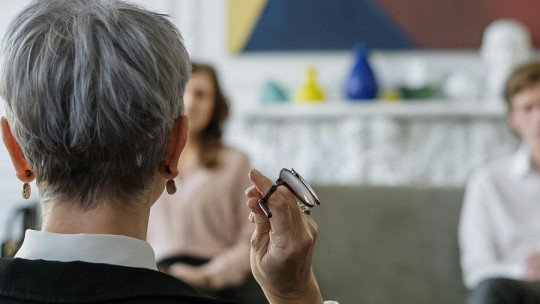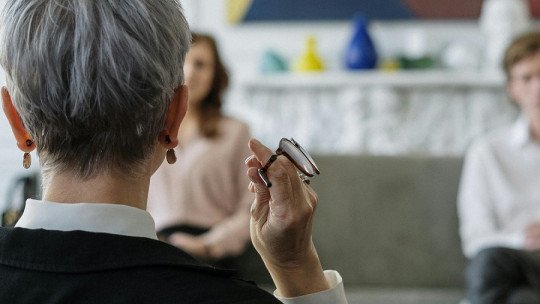
The relationship is a fundamental part of many people’s lives. In this coexistence, two individuals embark on a journey that can be full of joys, challenges and unforgettable moments. However, as in any life experience, obstacles can also arise along the way. Differences, disagreements, and communication problems are just some of the challenges couples can face on their journey together.
Couples therapy has become a valuable resource for those seeking to strengthen their relationship or overcome difficulties. This not only focuses on resolving conflicts, but also on strengthening the relationship and promoting effective communication. It helps couples understand each other, learn to manage stress, and develop strategies to face challenges together. Additionally, it can be a preventive tool, helping to identify and address problems before they become irreparable.
Let’s explore couples therapy in depth and how psychologists play a key role in its practice Throughout the next sections, we will discover the different aspects of couples therapy and the benefits it has on affected couples.
What is couples therapy?
Couples therapy is a psychological counseling process designed to help couples resolve conflicts, improve communication, and strengthen their relationship. This form of therapy focuses on couple dynamics and understanding how members of the relationship interact. At its core, couples therapy is a space where couples can explore their concerns and conflicts in a safe and confidential environment.
Couples therapy psychologists are professionals specialized in addressing the interpersonal and emotional dynamics of romantic and marital relationships Through couples therapy, couples can learn to communicate more effectively, resolve conflicts in healthy ways, and strengthen their emotional connection. The goals of couples therapy can vary depending on the specific needs and goals of each couple. Some of the common goals of this type of therapy include:
The role of the psychologist in couples therapy
Couples therapy is a highly specialized process that requires the guidance and experience of a trained professional. Couples therapy psychologists play a critical role in this process, working collaboratively with couples to help them overcome obstacles and challenges they may face in their relationship.
Who is a couples therapy psychologist?
A couples therapy psychologist is a mental health professional with specialized training in the field of couple relationships. They have completed their training in clinical psychology and have gained additional experience in couples therapy. These professionals are equipped to address the emotional, cognitive, and behavioral aspects of romantic and marital relationships
Training as a couples therapy psychologist allows them to deeply understand relationship dynamics and apply evidence-based therapeutic strategies to help couples resolve their problems and improve patients’ emotional well-being. Additionally, they are committed to high ethical standards, including confidentiality and respect for couples’ privacy.
Education and training required
To become a couples therapy psychologist, one must complete a series of educational and training steps:
Therapeutic techniques and approaches
In developing couples therapy, once therapeutic goals are established, the couples therapy psychologist employs a variety of therapeutic techniques and approaches to help couples overcome challenges and improve their relationship. Some of the common therapeutic approaches used in couples therapy are:
1. Cognitive-Behavioral Therapy (CBT)
CBT focuses on identifying and changing dysfunctional patterns of thinking and behavior that may contribute to relationship problems. Psychologists help couples recognize and replace negative thoughts and harmful behaviors for healthier ones.
2. Acceptance and Commitment Therapy (ACT)
ACT focuses on helping couples accept difficult thoughts and emotions, and then commit to actions that are aligned with their values and goals. This therapy promotes psychological flexibility and adaptation to changing circumstances.
3. Systemic Therapy
This approach focuses on the dynamics of the relationship and how each member of the couple influences the other. Couples therapy psychologists explore interactions and communication patterns to identify areas for improvement
4. Brief Therapy
In some cases, brief therapy is used to address specific problems in a limited period of time. This therapeutic modality focuses on solving specific problems and achieving specific objectives.
5. Couple Communication Therapy
This approach focuses on improving communication between members of the couple. Psychologists help couples learn effective communication strategies and resolve conflicts constructively.
Benefits of couples therapy
Couples therapy offers a number of benefits that can make a significant difference in the health and happiness of romantic and marital relationships As we move forward in this article, we will explore some of the key benefits of seeking help from a couples therapy psychologist.
1. Relationship improvement
One of the most notable benefits of couples therapy is the improvement of the relationship itself. As couples work together with a psychologist, they can learn to communicate more effectively, resolve conflicts constructively, and strengthen their emotional bond. This can result in a more satisfying and healthy relationship.
2. Prevention of future problems
Couples therapy is not only valuable when there are already problems in the relationship, but it can also be preventive. By addressing difficulties and learning coping strategies before problems become serious couples can prevent more serious crises in the future.
3. Development of coping skills
Couples therapy provides couples with tools and skills they can apply in their daily lives. Learning to communicate more effectively, resolve conflict, and manage stress can be beneficial not only for the relationship, but also for individual mental health.
4. Rebuilding trust
Couples therapy can help rebuild trust in a relationship after challenges such as infidelity or lack of communication. Psychologists work with couples to heal emotional wounds and reestablish a foundation of trust
5. Promoting intimacy
Couples therapy can also promote emotional and physical intimacy. Through open communication and strengthening emotional connection, couples can experience greater intimacy in their relationship.
6. Support in times of crisis
In times of crisis, such as the loss of a loved one or health problems, couples therapy can provide a valuable support system Psychologists can help couples face these difficulties together and maintain their relationship through difficult times.
Conclusions
In conclusion, couples therapy, guided by specialized psychologists, plays a crucial role in improving love and marital relationships. It offers tools for effective communication, conflict resolution and strengthening emotional intimacy. Additionally, it can prevent future problems and provide support in times of crisis. Couples therapy, through its benefits, contributes significantly to the health and happiness of couples, promoting stronger and more satisfying relationships.








